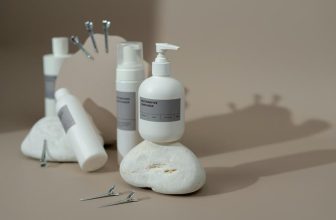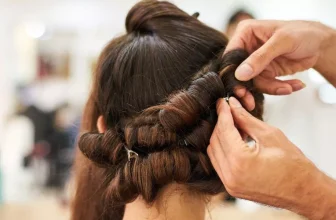
Stress can significantly impact both the health and appearance of your hair, leading to issues like hair loss, thinning, and changes in texture. Cortisol released during stress disrupts the hair growth cycle, causing hair follicles to enter a resting phase and depriving them of essential nutrients, while inflammation triggered by stress can worsen hair problems. If you want to understand more about how stress affects your hair and discover tips for managing it effectively, explore the ways stress can impact hair growth and learn about seeking professional help for any hair concerns you may have.
Understanding the Impact of Stress on Hair
If you're wondering how stress affects your hair, it's essential to understand the physiological mechanisms at play. When you experience stress, your body releases cortisol, known as the stress hormone. Elevated cortisol levels can disrupt the normal hair growth cycle, leading to issues like hair loss or thinning. Stress can also affect the blood flow to your scalp, potentially depriving hair follicles of essential nutrients and oxygen. This, in turn, can weaken the hair and impact its overall health and appearance.
Moreover, stress can trigger inflammatory responses in the body, which may impact the scalp and hair follicles. Inflammation can disrupt the hair growth cycle and contribute to conditions like dandruff or scalp irritation. Additionally, stress can lead to unhealthy habits like pulling or twisting your hair, further exacerbating hair problems.
Understanding how stress influences your hair can help you take proactive steps to mitigate its effects. Prioritizing stress management techniques and maintaining a healthy lifestyle can go a long way in preserving the health and vitality of your hair.
Signs of Stress-Related Hair Issues
When stress affects your hair, certain signs may indicate stress-related hair issues. One common sign is hair loss. Stress can trigger a condition called telogen effluvium, where a higher number of hair follicles enter the resting phase prematurely, leading to increased hair shedding. This can result in noticeable thinning of the hair on your scalp.
Another sign of stress-related hair problems is changes in hair texture. Stress can affect the production of proteins essential for hair strength and elasticity, causing your hair to become dry, brittle, or more prone to breakage.
Additionally, experiencing stress may lead to scalp issues such as dandruff, itching, or even scalp pain. These symptoms can be indicators that your hair health is being impacted by stress. It's important to pay attention to these signs and consider ways to manage stress to help maintain healthy hair growth and appearance.
Ways Stress Can Affect Hair Growth
Stress can impact hair growth by disrupting the normal hair growth cycle. When you experience high levels of stress, your body releases cortisol, a hormone that can interfere with the hair's growth process. This disruption can lead to more hair follicles entering the resting phase, known as telogen effluvium, causing increased shedding and thinning of the hair.
Furthermore, stress can also affect the scalp, leading to conditions such as dandruff, scalp psoriasis, or seborrheic dermatitis. These scalp issues can create an unhealthy environment for hair follicles, hindering their ability to grow strong, healthy hair.
In addition, chronic stress can impact the immune system, potentially triggering autoimmune conditions like alopecia areata, where the immune system mistakenly attacks the hair follicles, leading to hair loss.
Understanding how stress affects hair growth is crucial in maintaining healthy and vibrant hair. By managing stress effectively, you can help support a balanced hair growth cycle and promote overall hair health.
Tips for Managing Stress for Healthier Hair
To maintain healthier hair in the face of stress, consider incorporating various stress management techniques into your daily routine. Stress can negatively impact your hair health, leading to issues like hair loss, dullness, and breakage.
Here are some tips to help you manage stress effectively for healthier hair:
- Practice Relaxation Techniques: Incorporate relaxation techniques such as deep breathing, meditation, or yoga into your daily routine to help reduce stress levels.
- Exercise Regularly: Physical activity can help reduce stress and improve blood circulation to the scalp, promoting healthier hair growth.
- Get Adequate Sleep: Lack of sleep can contribute to increased stress levels, impacting your hair health. Aim for 7-9 hours of quality sleep each night.
- Maintain a Healthy Diet: Eating a balanced diet rich in vitamins, minerals, and antioxidants can support hair health and help combat the effects of stress.
- Engage in Stress-Relieving Activities: Find activities you enjoy, such as reading, painting, or spending time in nature, to help relax and unwind from daily stressors.
Seeking Professional Help for Hair Concerns
Considering professional help for your hair concerns can provide valuable insights and solutions to improve its overall health and appearance. Hair professionals, such as dermatologists, trichologists, and hairstylists, have the expertise to assess your hair condition accurately.
A dermatologist can diagnose underlying scalp conditions, prescribe medications, or recommend treatments to address hair loss or scalp issues effectively. Trichologists specialize in hair and scalp health, offering personalized advice on nutrition, hair care routines, and potential lifestyle changes to promote hair growth and vitality. Hairstylists can provide tailored recommendations for haircut styles, color treatments, and products that suit your hair type and concerns.
Seeking professional help enables you to receive customized care and targeted solutions based on your specific needs. Additionally, these experts can offer guidance on how to maintain a healthy hair care routine and prevent further damage. Don't hesitate to consult with a professional to address your hair concerns and enhance the health and appearance of your hair.




